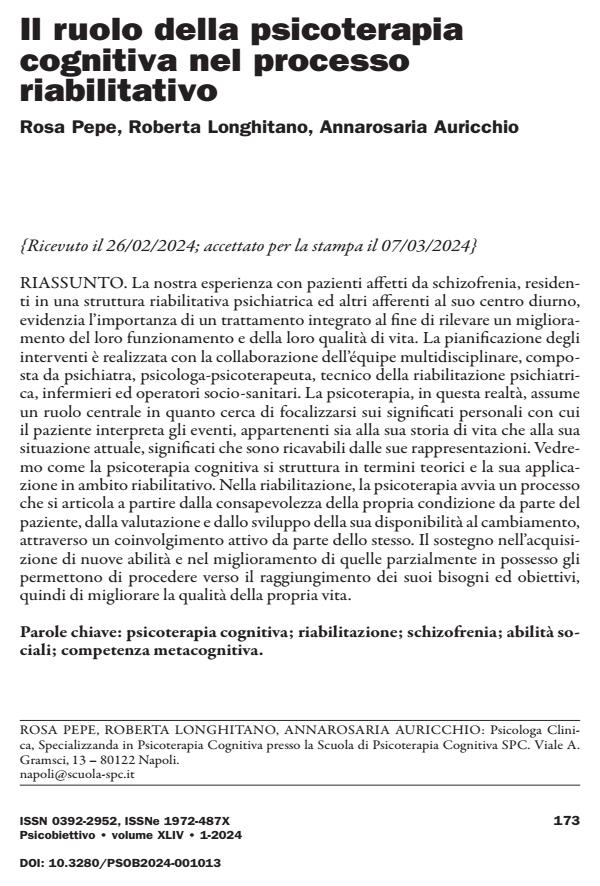Il ruolo della psicoterapia cognitiva nel processo riabilitativo
Titolo Rivista PSICOBIETTIVO
Autori/Curatori Rosa Pepe, Roberta Longhitano, Annarosaria Auricchio
Anno di pubblicazione 2024 Fascicolo 2024/1
Lingua Italiano Numero pagine 9 P. 173-181 Dimensione file 122 KB
DOI 10.3280/PSOB2024-001013
Il DOI è il codice a barre della proprietà intellettuale: per saperne di più
clicca qui
Qui sotto puoi vedere in anteprima la prima pagina di questo articolo.
Se questo articolo ti interessa, lo puoi acquistare (e scaricare in formato pdf) seguendo le facili indicazioni per acquistare il download credit. Acquista Download Credits per scaricare questo Articolo in formato PDF

FrancoAngeli è membro della Publishers International Linking Association, Inc (PILA)associazione indipendente e non profit per facilitare (attraverso i servizi tecnologici implementati da CrossRef.org) l’accesso degli studiosi ai contenuti digitali nelle pubblicazioni professionali e scientifiche
La nostra esperienza con pazienti affetti da schizofrenia, residenti in una struttura riabilitativa psichiatrica ed altri afferenti al suo centro diurno, evidenzia l’importanza di un trattamento integrato al fine di rilevare un miglioramento del loro funzionamento e della loro qualità di vita. La pianificazione degli interventi è realizzata con la collaborazione dell’équipe multidisciplinare, composta da psichiatra, psicologa-psicoterapeuta, tecnico della riabilitazione psichiatrica, infermieri ed operatori socio-sanitari. La psicoterapia, in questa realtà, assume un ruolo centrale in quanto cerca di focalizzarsi sui significati personali con cui il paziente interpreta gli eventi, appartenenti sia alla sua storia di vita che alla sua situazione attuale, significati che sono ricavabili dalle sue rappresentazioni. Vedremo come la psicoterapia cognitiva si struttura in termini teorici e la sua applicazione in ambito riabilitativo. Nella riabilitazione, la psicoterapia avvia un processo che si articola a partire dalla consapevolezza della propria condizione da parte del paziente, dalla valutazione e dallo sviluppo della sua disponibilità al cambiamento, attraverso un coinvolgimento attivo da parte dello stesso. Il sostegno nell’acquisizione di nuove abilità e nel miglioramento di quelle parzialmente in possesso gli permettono di procedere verso il raggiungimento dei suoi bisogni ed obiettivi, quindi di migliorare la qualità della propria vita.
Parole chiave:psicoterapia cognitiva; riabilitazione; schizofrenia; abilità sociali; competenza metacognitiva.
Rosa Pepe, Roberta Longhitano, Annarosaria Auricchio, Il ruolo della psicoterapia cognitiva nel processo riabilitativo in "PSICOBIETTIVO" 1/2024, pp 173-181, DOI: 10.3280/PSOB2024-001013